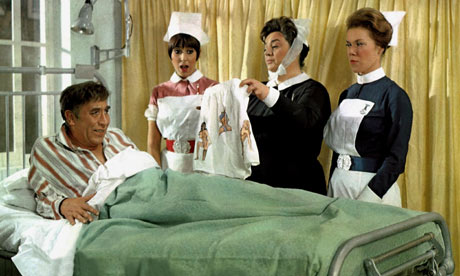
The NHS should use bingo, art classes and beds with views of green spaces to help patients beat the boredom, depression and social isolation of being in hospital, doctors' leaders are urging.
Drama therapy, sunnier rooms, live musical performances and quieter wards would also help make patients happier and speed their recovery, says the British Medical Association. A new report from the BMA's Board of Science, seen by the Observer, highlights how a spell in hospital will prove tedious and dispiriting for many patients.
It says hospitals should do more to stop those receiving treatment from simply lounging around in their pyjamas in bed for much of the day.
"Hospitalisation presents specific stresses over and above those associated with illness, ranging from environmental factors such as unfamiliar surroundings to the lack of privacy and independence, and uncertainty about ill-health outcomes," the report says. "When a patient's needs are not met it may affect their emotional state."
While most people adjust well to illness confining them, "a significant proportion find their emotional and social coping mechanisms are challenged. Physical illness can have profound social and emotional consequences," it adds, pointing out that a patient's loss of their normal role as a parent, worker or provider can be very unsettling. The study collates evidence from around the world about measures shown to help meet what it calls patients' psychosocial needs.
Playing lullabies and classical music to premature babies aided their weight gain. Cancer patients receiving chemotherapy at London's Chelsea and Westminster Hospital who viewed art exhibitions had lower levels of anxiety and depression. Installing high-performance ceiling tiles in a coronary critical care unit in Sweden helped reduce noise from staff, machines and buzzers that can annoy patients.
Dr Vivienne Nathanson, the BMA's head of science and ethics, said: "Some simple and inexpensive soft, non-clinical things – such as getting more daylight in, planting some trees outside the ward, or encouraging patients to wander around a bit – can help shorten a patient's time in hospital and reduce their demand for pain relief.
"So there's clearly a clinical, and potentially financial, justification for the NHS to ask which of these things each unit can do, within the hospital's budget of course."
The design brief for all new NHS facilities should include provision for layouts and colour schemes that will produce the most relaxing atmosphere, she added. Hospital gardens, single-sex accommodation and even pictures of landscapes on the wall can promote a sense of wellbeing among patients.
At Salisbury District Hospital in Wiltshire, volunteers play card games, lay on bingo sessions and read newspapers with patients on the elderly care ward, and those who have had strokes. Each weekday some of the 15 volunteers, who are all psychology graduates or students, spend three hours with up to 10 patients doing individual or group activities.
Dr Kate Jenkins, a clinical psychologist who runs the programme at the hospital, said: "When people are in hospital for a while they get used to lying in bed and looking at the walls of their room or the ward.
"Patients can become depressed with a lack of stimulation, especially elderly people who are likely to have less of a social network than patients in their 20s."
"One volunteer played snap with a man who'd lost the ability to speak after a stroke, and who had said and done nothing apart from staring at a wall in the two weeks since he arrived. But during the game he was slapping his hand down and laughing when he won. Staff were amazed," added Jenkins.
In so-called "reminiscence sessions" the volunteers ask stroke patients to recall key early-life events such as their wedding, their role in the war or experience of the 1960s.
The initiative, launched last year, has been so successful, the hospital hopes to extend it to other wards, with younger patients.
Depression among participants has fallen, patient satisfaction has risen and length of stay on the two wards has dropped by 25%, said Jenkins."Sadly I don't think there's a lot of this sort of stuff going on in the NHS," she added. "A lot of it is about changing the culture in hospitals, getting people to realise that you don't have to have pyjamas on and stay in bed all day. Your brain is a muscle like any other; you use it or you lose it."In a report last week the NHS Confederation, which represents hospitals, found that patients in those whothat tackled issues such as noise, privacy and quality of food were happier and healthier and did better. But hospitals needed to worker harder to improve patient experience, it said.

